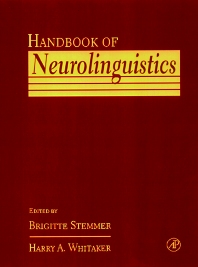Books in Discourse pragmatics and sociolinguistics
Books in Discourse pragmatics and sociolinguistics

The Discourse of Negotiation
Studies of Language in the Workplace- 1st Edition
- A. Firth
- English

Language Processing in Social Context
- 1st Edition
- Volume 54
- R. Dietrich + 1 more
- English

Sociolinguistic Metatheory
- 1st Edition
- E. Figueroa
- English

Concise Encyclopedia of Pragmatics
- 2nd Edition
- J.L. Mey + 1 more
- English

Knowledge and Language
- 1st Edition
- Volume 39
- I. Kurcz + 2 more
- English

Concise Encyclopedia of Sociolinguistics
- 1st Edition
- R. Mesthrie
- English

Mental Models in Discourse Processing and Reasoning
- 1st Edition
- Volume 128
- G. Rickheit + 1 more
- English

Handbook of Neurolinguistics
- 1st Edition
- Harry A. Whitaker + 1 more
- English

Discourse and Syntax
Syntax and Semantics- 1st Edition
- Talmy Givón
- English